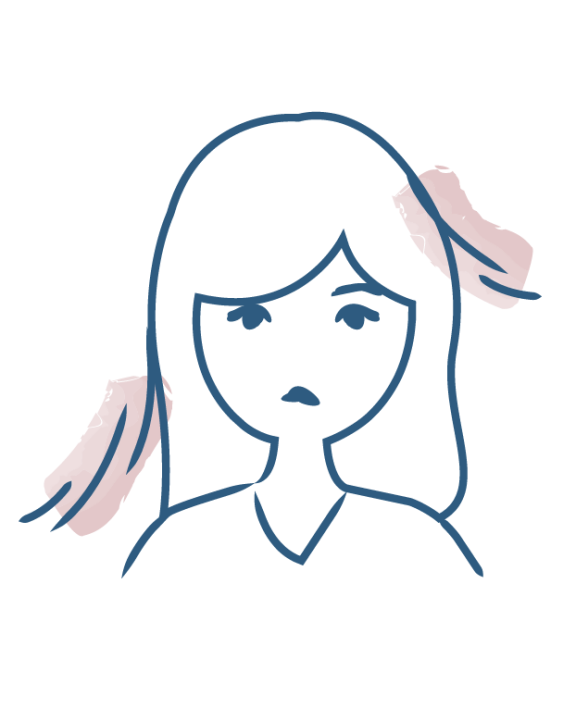The causes of hair loss
Hair loss due to ringworm of the scalp
- The causes of hair loss
- Secondary syphilis and hair loss
- Spot baldness and hair loss
- Scarring alopecia
- Hair loss due to ringworm of the scalp
- Hair loss and Covid
- Drug-induced hair loss
- Hair loss and genetics
- What is traction alopecia?
- Pregnancy and hair loss: everything you need to know
- Hair loss and hormones
- Hair loss: the impact of iron, zinc, vitamin D, C and B12 deficiencies
- Hair loss and fatigue
- Hair loss due to stress: reactional hair loss
- Hair loss and the pill
- Hair loss and menopause

Hair loss due to ringworm of the scalp
Ringworm is an infection of the hair follicle of the scalp caused by microscopic fungi. It is very common, especially in children. In terms of hair, ringworm is responsible for localized alopecia, which disappears after appropriate treatment in most cases.
Ringworm, a scalp disease
Ringworm is a very common scalp disease, especially in children and people with weakened immune systems. It can be very contagious.
In infected individuals, the fungi responsible for ringworm, dermatophytes, penetrate and proliferate in the hair follicle. The infected hair breaks and falls out. Like spot baldness, ringworm is one of the causes of hair loss in patches. Depending on the type of dermatophyte involved, ringworm manifests itself either as multiple small round patches 1 cm in diameter or as a single large patch. The patches of ringworm alopecia are round in shape, with well-defined contours, and are covered with small dead skin cells, like dandruff, called scales.
Hair ringworm causes itching that can impair quality of life.
The most severe form of hair ringworm causes the appearance of round, raised, highly inflammatory and painful patches several centimeters long. This is called kerion.
In men, ringworm is not only in the hair: it is sometimes located on the beard or mustache, but also on the hair of the chest, arms and legs. The risk of superinfection is high, leading to painful inflammatory reactions (folliculitis).
A sample of the fungus obtained by scratching the alopecia patch allows the doctor to identify the fungus involved.
How to avoid hair loss due to ringworm
It is often contagious and specific hygiene measures are necessary to prevent ringworm in the hair and to eliminate the fungi responsible:
- Avoid direct or indirect contact with the skin and hair of an infected person;
- Avoid exchanging clothing, especially hats and scarves, or brushes and combs;
- Wear long hair tied back;
- Wash hands regularly and keep fingernails short;
- Wash clothes and fabrics thoroughly at 60 degrees;
- Clean and vacuum your environment regularly.
Hair ringworm can be transmitted by a pet. In this case, it must also be treated to stop the spread of the fungus and avoid reinfection.
Can hair grow back after ringworm?
Permanent alopecia in the case of hair ringworm is exceptional. Alopecic scars are observed in some cases of kerion, the most severe form of hair ringworm.
In the majority of cases, after elimination of the fungus by an appropriate oral and/or cutaneous antifungal treatment, the hair will grow back completely within 3 to 6 months.
More information
- Discover Hair loss due to stress: reactional hair loss
The causes of hair loss
Hair loss due to stress: reactional hair loss
- Discover Hair loss and menopause
The causes of hair loss
Hair loss and menopause
- Discover Hair loss and genetics
The causes of hair loss
Hair loss and genetics
- Discover Drug-induced hair loss
The causes of hair loss
Drug-induced hair loss
- Discover Hair loss and hormones
The causes of hair loss
Hair loss and hormones
- Discover Pregnancy and hair loss: everything you need to know
The causes of hair loss
Pregnancy and hair loss: everything you need to know
- Discover Hair loss: the impact of iron, zinc, vitamin D, C and B12 deficiencies
The causes of hair loss
Hair loss: the impact of iron, zinc, vitamin D, C and B12 deficiencies
- Discover Hair loss and fatigue
The causes of hair loss
Hair loss and fatigue
- Discover What is traction alopecia?
The causes of hair loss
What is traction alopecia?
- Discover Hair loss and Covid
The causes of hair loss
Hair loss and Covid
- Discover Secondary syphilis and hair loss
The causes of hair loss
Secondary syphilis and hair loss
- Discover Spot baldness and hair loss
The causes of hair loss
Spot baldness and hair loss
- Discover Scarring alopecia
The causes of hair loss
Scarring alopecia
Our care routines
Loss of hair density
- Discover MY ROUTINE AGAINST CHRONIC HAIR DENSITY LOSS IN MEN (OVER 6 MONTHS)
MY ROUTINE AGAINST CHRONIC HAIR DENSITY LOSS IN MEN (OVER 6 MONTHS)
Are you losing your hair?
- Discover Anti-reactional loss of hair volume for post-pregnancy and breastfeeding women
Anti-reactional loss of hair volume for post-pregnancy and breastfeeding women
Like many young mothers, you are experiencing some discomfort following your pregnancy?
- Discover MY OCCASIONAL HAIR DENSITY LOSS ROUTINE FOR WOMEN (LESS THAN 6 MONTHS)
MY OCCASIONAL HAIR DENSITY LOSS ROUTINE FOR WOMEN (LESS THAN 6 MONTHS)
Are you losing your hair?
- Discover MY OCCASIONAL HAIR DENSITY LOSS ROUTINE FOR MEN (LESS THAN 6 MONTHS)
MY OCCASIONAL HAIR DENSITY LOSS ROUTINE FOR MEN (LESS THAN 6 MONTHS)
Are you experiencing loss of hair density?
Dermatological expertise
To better understand your skin and hair, discover our exclusive content and innovative care products designed to improve your quality of life..


